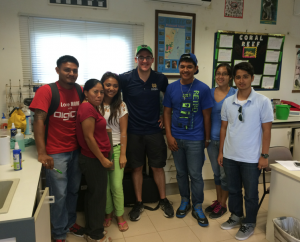Warm wishes from Belize!
My name is Luke Wren and I graduated from Wabash last May as part of the class of 2014. I am currently typing this on a sunny cement balcony in the northern part of Belize, in a small town called Orange Walk. When many people hear “Belize” they see visions of vast oceanside, images of colorful fish shimmering in the water, or a coconut tree shedding its hard-shelled goodness. However, Belize is much more then simply a great place to vacation or prime real estate for wealthy expats. Belize is a culturally unique place with numerous ethnic groups, and even more small villages full of Belizean culture.
 Belize, formally British Honduras, is the youngest country in the western Hemisphere. Although young, Belize has a very rich history and one that dates back for millennia. At one point millions of Mayans lived throughout much of Central America, including Belize. Mayans form civilized city-states and were much more then simple hut-living indigenous people. They had routes of trade, fought wars, built temples, and created some of the most beautiful monuments (now ruins) in Belize.
Belize, formally British Honduras, is the youngest country in the western Hemisphere. Although young, Belize has a very rich history and one that dates back for millennia. At one point millions of Mayans lived throughout much of Central America, including Belize. Mayans form civilized city-states and were much more then simple hut-living indigenous people. They had routes of trade, fought wars, built temples, and created some of the most beautiful monuments (now ruins) in Belize.
Belize is full of wildlife, rivers, caves, mountains, beaches, and cayes. Although rich in biodiversity there are still over 300,000 humans that call Belize home. It is for these Belizeans, especially the impoverished ones among them, that I am here. I am currently in the University of Notre Dame’s Master of Science in Global Health Program, which is a part of the Eck Institute for Global Health. After completing two semesters of classes, I now have the opportunity to complete my capstone project focused on global health.
What drew me into global health? Primarily it was Wabash’s own Dr. Eric Wetzel. Dr. Wetzel provided me the opportunity, along with many of my peers to travel to Peru in the summer of 2012 for two weeks. During this immersion trip we worked alongside doctors, medical students, and veterinary students and helped with conducting local community health clinics. This experience opened my eyes to what medicine the majority of those on Earth have. Most people do not have access to full care hospitals, sanitary environments in which to give birth, or even a “standard” clinical setting to give birth. Many births are done at home or at local health centers. This educational experience did what Dr. Wetzel says our education should do…it disturbed me.
Being disturbed in an educational setting is what takes knowledge and changes it into action. You can read a book about malaria or watch a documentary or series of YouTube videos, but without seeing how Malaria affects people with your own eyes it keeps the information in 2-dimensional space, and thus is very hard to fully understand. Being disturbed by something changes something within and that can be bad at times, but in this case it was positive.
Travelling to Peru, hearing the sounds, smelling the smells, touching things that Peruvians touch, walking where Peruvians walk, took my education to a different level…and it made me sick to my stomach. I will never forget the feeling I had standing on the side of a hill in a slum of Lima, called Pamplona Alta. I look out and see tarps, filth, garbage, disease-ridden dogs…I smell burned trash, burned feces, but most importantly I see homes. People live here. People grow up here. People fall in love here. People grow old here. I have never felt so bad for having so much. All of my petty complaints of my life were dwarfed compared to the daily lives of these Peruvians. I knew I had to change what I wanted to do.
I have always wanted to become a doctor, at least since high school. I still plan on becoming a doctor, but my path to get there and what type of doctor I want to be has changed because of my trip to Peru. I pursued this Masters at Notre Dame not only for the education and experience, but for the opportunity to travel and learn more about resource poor-settings. My goal is to become a rural doctor, focusing on resource poor-settings.
I am in Belize to study Chagas disease, a parasite-caused disease that is transmitted by Triatomine bugs or “kissing bugs”. These bugs contain the parasite in their feces and can transmit the parasite to humans. When humans get infected with the parasite they can have acute symptoms, but not all show signs of acute symptoms and go straight into the chronic phase, which after a period of time (10+ years) a person can have fatal occurrences of heart disease, digestive issues, and damaged organs.
The two aims of my study are to:
1) Look at the effectiveness of current control strategies like insecticide-treated bed nets, insecticide paints, and indoor residual spray (more insecticide) on the vector.
2) Survey local heads-of-households in surrounding villages of San Ignacio, Belize. I hope to better understand how much local populations know about Chagas disease, the vector, signs and symptoms, and current control methods with the goal of providing the Belize Ministry of Health this information so they can streamline future directed educational campaigns.
I plan on updating my blog at least once a week, and hopefully with pictures. I will not just talk about research but my experiences, and my thoughts. Please feel free to pass this along to anyone you think might find this interesting.
Here is a link for more information on Chagas Disease: http://www.cdc.gov/parasites/chagas/
That’s all for now,
Luke